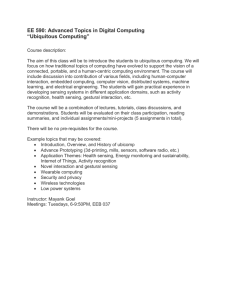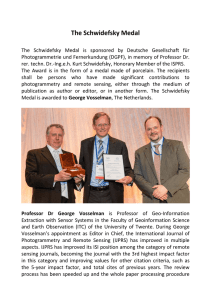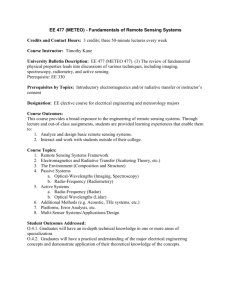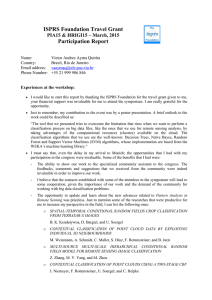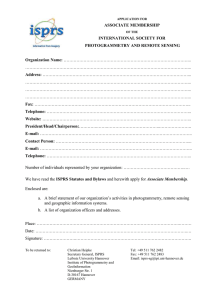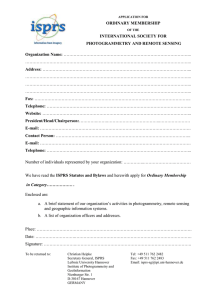53 Gamble Award Citations
advertisement
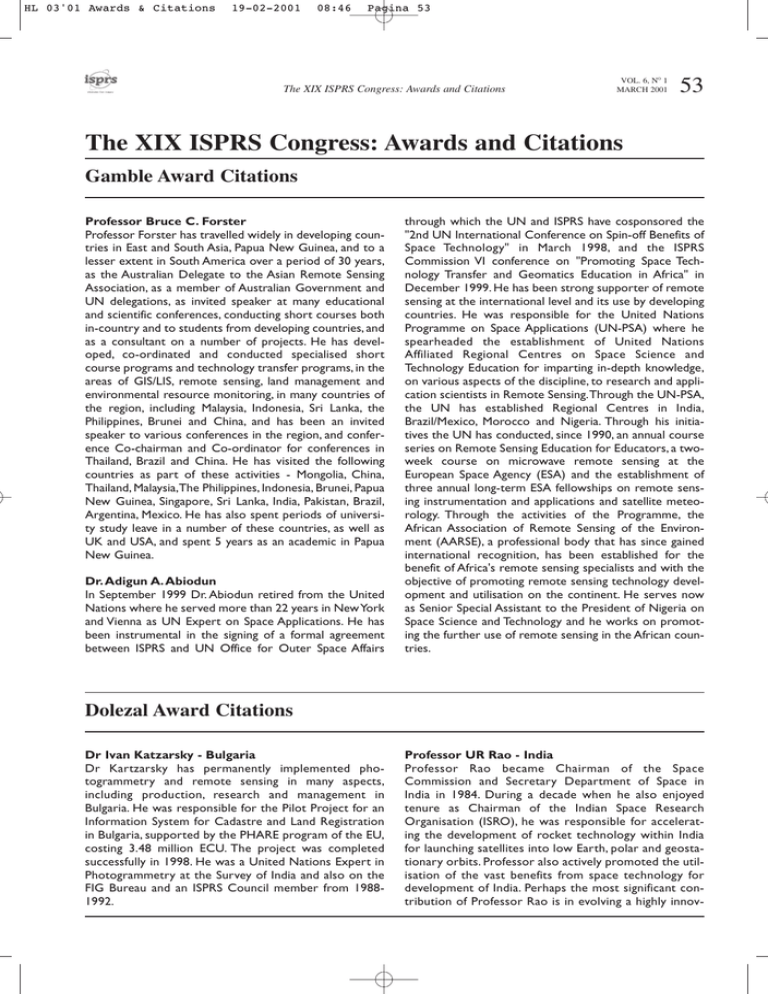
HL 03'01 Awards & Citations 19-02-2001 08:46 Pagina 53 The XIX ISPRS Congress: Awards and Citations VOL. 6, NO 1 MARCH 2001 53 The XIX ISPRS Congress: Awards and Citations Gamble Award Citations Professor Bruce C. Forster Professor Forster has travelled widely in developing countries in East and South Asia, Papua New Guinea, and to a lesser extent in South America over a period of 30 years, as the Australian Delegate to the Asian Remote Sensing Association, as a member of Australian Government and UN delegations, as invited speaker at many educational and scientific conferences, conducting short courses both in-country and to students from developing countries, and as a consultant on a number of projects. He has developed, co-ordinated and conducted specialised short course programs and technology transfer programs, in the areas of GIS/LIS, remote sensing, land management and environmental resource monitoring, in many countries of the region, including Malaysia, Indonesia, Sri Lanka, the Philippines, Brunei and China, and has been an invited speaker to various conferences in the region, and conference Co-chairman and Co-ordinator for conferences in Thailand, Brazil and China. He has visited the following countries as part of these activities - Mongolia, China, Thailand, Malaysia,The Philippines, Indonesia, Brunei, Papua New Guinea, Singapore, Sri Lanka, India, Pakistan, Brazil, Argentina, Mexico. He has also spent periods of university study leave in a number of these countries, as well as UK and USA, and spent 5 years as an academic in Papua New Guinea. Dr. Adigun A. Abiodun In September 1999 Dr. Abiodun retired from the United Nations where he served more than 22 years in New York and Vienna as UN Expert on Space Applications. He has been instrumental in the signing of a formal agreement between ISPRS and UN Office for Outer Space Affairs through which the UN and ISPRS have cosponsored the "2nd UN International Conference on Spin-off Benefits of Space Technology" in March 1998, and the ISPRS Commission VI conference on "Promoting Space Technology Transfer and Geomatics Education in Africa" in December 1999. He has been strong supporter of remote sensing at the international level and its use by developing countries. He was responsible for the United Nations Programme on Space Applications (UN-PSA) where he spearheaded the establishment of United Nations Affiliated Regional Centres on Space Science and Technology Education for imparting in-depth knowledge, on various aspects of the discipline, to research and application scientists in Remote Sensing.Through the UN-PSA, the UN has established Regional Centres in India, Brazil/Mexico, Morocco and Nigeria. Through his initiatives the UN has conducted, since 1990, an annual course series on Remote Sensing Education for Educators, a twoweek course on microwave remote sensing at the European Space Agency (ESA) and the establishment of three annual long-term ESA fellowships on remote sensing instrumentation and applications and satellite meteorology. Through the activities of the Programme, the African Association of Remote Sensing of the Environment (AARSE), a professional body that has since gained international recognition, has been established for the benefit of Africa's remote sensing specialists and with the objective of promoting remote sensing technology development and utilisation on the continent. He serves now as Senior Special Assistant to the President of Nigeria on Space Science and Technology and he works on promoting the further use of remote sensing in the African countries. Dolezal Award Citations Dr Ivan Katzarsky - Bulgaria Dr Kartzarsky has permanently implemented photogrammetry and remote sensing in many aspects, including production, research and management in Bulgaria. He was responsible for the Pilot Project for an Information System for Cadastre and Land Registration in Bulgaria, supported by the PHARE program of the EU, costing 3.48 million ECU. The project was completed successfully in 1998. He was a United Nations Expert in Photogrammetry at the Survey of India and also on the FIG Bureau and an ISPRS Council member from 19881992. Professor UR Rao - India Professor Rao became Chairman of the Space Commission and Secretary Department of Space in India in 1984. During a decade when he also enjoyed tenure as Chairman of the Indian Space Research Organisation (ISRO), he was responsible for accelerating the development of rocket technology within India for launching satellites into low Earth, polar and geostationary orbits. Professor also actively promoted the utilisation of the vast benefits from space technology for development of India. Perhaps the most significant contribution of Professor Rao is in evolving a highly innov- HL 03'01 Awards & Citations 54 19-02-2001 VOL. 6, NO 1 MARCH 2001 08:46 Pagina 54 The XIX ISPRS Congress: Awards and Citations ative integrated management strategy aimed at the development of sustainable management at micro level, to meet the needs of the present as well as the projected needs of the future generation within ecological balance. Parviz Tarikhi – Iran Mr Parviz Tarikhi is the Space Science and Technology Specialist at the Iranian Remote Sensing Centre (IRSC) in Tehran Iran. He has also been the Editor-in-Chief of the IRSC Newsletter since 1992. He has compiled 5 books and 27 articles on remote sensing, mostly in the Persian language. He has also translated 11 English and French textbooks into the Persian language. Mr Tarikhi has achieved a great deal in communicating remote sensing technologies in Iran. Remote Sensing by Low-frequency Radars 20-21 September 2001 Papers r o f l l Ca European Association of Remote Sensing Laboratories (EARSeL) Consortium of Research on Remote Sensing Advanced Systems (CO.RI.S.T.A.) The Workshop EARSeL and CO.RI.S.T.A. propose this Workshop, whose aim is to study in depth a particular field of Remote Sensing, the employment of low-frequency radars. During recent years low-frequency radars, able to operate up to the L-band, have aroused much attention among the scientific international community, due to the increasing number of applications within the field of Remote Sensing.The scenario has rapidly widened and includes archaeology, ecology, environment, geology and geophysics, glaciology, oceanography, planetology, UXO and mine detection. Therefore, innovative radar systems coupled with the design and development of more effective data processing and numerical modelling techniques, inverse problems and tomography have become main subjects of study. The workshop’s objective is to discuss the latest technological developments, thus opening the way to future deadline conferences on this subject. The workshop is directed not only to scientists and research centres, but also to users who are interested in the innovations that research and technological development can offer, in particular, institutions, public bodies and companies which are responsible for land management, cultural heritage preservation or environmental protection and which are looking for new perspectives in performing their tasks. Call for Papers Papers will be presented orally and by poster.Authors who prefer a poster presentation should notify the organisers. An extended abstract (1000 words) should be sent before 15 March 2001 to the organising committee. Authors are notified by 15 April 2001. Organising Committee M. Godefroy (EARSeL) 2 Avenue Rapp F-75340 Paris, Cedex 07 France Tel. +33 1 45567360 Fax +33 1 45567361 E-mail: earsel@meteo.fr http://www.earsel.org
